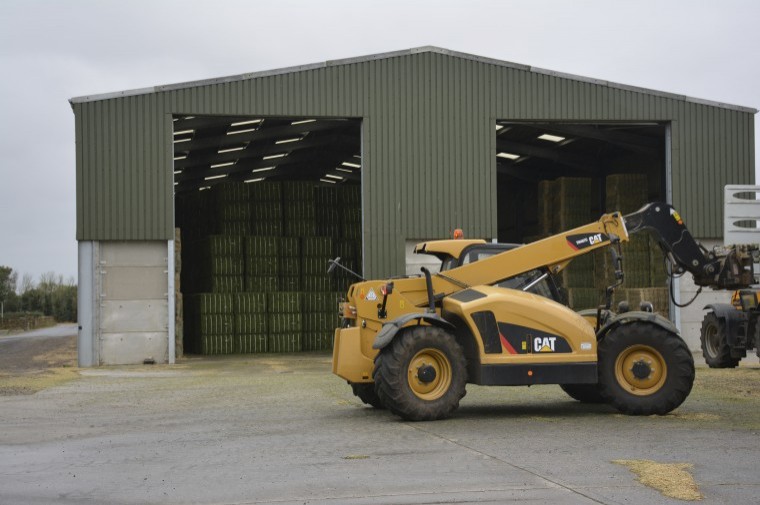The Southminster, Essex-based family business has just commissioned its fifth farm building from Robinson Structures, with father and son team John and Ben Fisher confident that they will again receive the quality of building and customer service that they have come to expect.
“We always ask for prices from a number of suppliers and Robinsons is always there or thereabouts, but when we factor in the support and advice we receive from the whole team – and the quality of the finished product – we know that our best option is to stick with Robinsons,” explained John.
For a company as diverse as D J Fisher Farms, which includes renewable energy and commercial lets in a broad portfolio rooted in arable farming, the fact that the family firm relies on one supplier for its new buildings is something Alex Robinson is rightly proud of.
“We always aim to give a quality service and there is nothing better than seeing customers return time after time,” said Alex, the commercial director for the Lewes-based steel-frame experts.
“Focusing on quality and good advice is what has seen us develop such a strong presence in the South East over the past few years. We now have more projects on our books than ever before, with grain, fruit and cattle buildings all in the pipeline or in progress. Business has never been better.”
D J Fisher Farms was set up by John’s father David, who still takes an active interest in the business. He bought 250 hectares of land on the Dengie marshes in the early 1950s and moved to Southminster Hall a few years later after buying a further 600 acres.
John, who joined his father in the business in the early to mid-seventies, explained that the business had been founded on hard graft. “Dad started with nothing using borrowed money and worked hard to get the business off the ground,” he explained.
When the family found gravel under some of the land, they made the most of the opportunity it offered, earning enough to pay off the loan and drain the farm to increase productivity.
That focus on reinvesting income in increasing productivity has been retained through the generations, with recent improvements including mole draining the whole farm. “Anything that isn’t right, we try to put right,” John explained. “It’s an approach that has paid dividends through the years.”
When it comes to farm buildings, the focus is on getting it right first time, which explains the decision to use Robinson Structures, not once but on four occasions – with a fifth building about to move from drawing board to site.
The first Robinson Structures building was a 13,000 square ft store at Ashelden Hall Farm, built to be used by Dengie Crop Driers, a local company which David helped to establish as one of its founder members. D J Fisher Farms remains a shareholder in the business and John is now on the board.
That building was followed by a second, slightly larger building on the same farm, also for Dengie, a third grain store at Bridgewick Farm and then an extension to an industrial unit at Mayland Farm. The fifth – again for Dengie – will follow shortly when planning details are finalised and will be a replica of the first building and erected alongside it.
Like all the farm buildings commissioned by D J Fisher Farms, the 180 ft by 72 ft barn will be built with grain walling to give it maximum flexibility, even though the business’ wide ranging interests may see it used for other crops at times. It will be able to hold just under 3,000 tonnes of grain.
D J Fisher Farms grows lucerne that is used by Dengie Crop Driers to make high-quality horse feed, Alph-Alpha, for which the business has a Royal Warrant. Ben explained that the local soil was ideal for lucerne, which is a good break crop and helps in the fight against black grass.
“After drilling, it needs minimal inputs over the next three years and it provides a good income, especially when wheat prices are low,” he said. It also helps to spread the workload for both man and machine. “Lucerne’s low maintenance means we can keep labour to a minimum and spread combine capacity,” Ben explained.
The business, which now farms just under 3,000 acres, also grows milling wheat, oilseed rape and Sakura peas, which are exported to Japan for human consumption.
Diversification has been an important part of the family business’s approach over the years, with any unused buildings renovated and rented out to other local enterprises, which include furniture manufacturing and micro-brewery Wibblers, now based in a restored listed building.
“We have also invested heavily in the residential market in recent years, and while this slowed following the stamp duty increase, commercial lettings are still good,” explained John.
Many of the commercial clients who use buildings owned by D J Fisher Farms also benefit from the company’s commitment to the environment, which means that there is low cost energy available from 11 solar installations across six different sites and two wind turbines. The business is considering investing in anaerobic digestion.
With work about to start on the next building by Robinson Structures, John Fisher pointed out that the steel frame company’s commitment included help with the planning process as well as all the preparatory work necessary. Robinson Structures will be responsible for the whole project, including the groundworks, steel frame, cladding and drainage.




